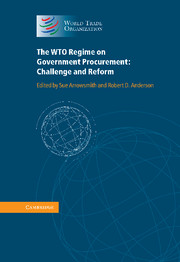Book contents
- Frontmatter
- Contents
- List of contributors
- Foreword by Pascal Lamy
- Perspective of the Chairman of the WTO Committee on Government Procurement, Nicholas Niggli (Switzerland)
- Preface
- Disclaimer
- PART I The WTO regime on government procurement
- PART II Expanding the scope of the Agreement on Government Procurement: accession and coverage
- 2 Forging a more global procurement market: issues concerning accessions to the Agreement on Government Procurement
- 3 Accession to the Agreement on Government Procurement: the case of China
- 4 India's possible accession to the Agreement on Government Procurement: what are the pros and cons?
- 5 The benefits for developing countries of accession to the Agreement on Government Procurement: the case of Chinese Taipei
- 6 The coverage negotiations under the Agreement on Government Procurement: context, mandate, process and prospects
- 7 Canada's sub-central government entities and the Agreement on Government Procurement: past and present
- 8 The procurement of state trading enterprises under the WTO Agreements: a proposal for a way forward
- 9 Addressing purchasing arrangements between public sector entities: what can the WTO learn from the EU's experience?
- PART III Revision of the procedural rules and other transparency provisions of the Agreement on Government Procurement
- PART IV Developing countries in the WTO procurement regime
- PART V Economic and social development (horizontal policies) in government procurement
- PART VI Enforcement and remedies
- PART VII Multilateralism and regionalism
- PART VIII Challenges and new directions
- Index
4 - India's possible accession to the Agreement on Government Procurement: what are the pros and cons?
from PART II - Expanding the scope of the Agreement on Government Procurement: accession and coverage
Published online by Cambridge University Press: 07 September 2011
- Frontmatter
- Contents
- List of contributors
- Foreword by Pascal Lamy
- Perspective of the Chairman of the WTO Committee on Government Procurement, Nicholas Niggli (Switzerland)
- Preface
- Disclaimer
- PART I The WTO regime on government procurement
- PART II Expanding the scope of the Agreement on Government Procurement: accession and coverage
- 2 Forging a more global procurement market: issues concerning accessions to the Agreement on Government Procurement
- 3 Accession to the Agreement on Government Procurement: the case of China
- 4 India's possible accession to the Agreement on Government Procurement: what are the pros and cons?
- 5 The benefits for developing countries of accession to the Agreement on Government Procurement: the case of Chinese Taipei
- 6 The coverage negotiations under the Agreement on Government Procurement: context, mandate, process and prospects
- 7 Canada's sub-central government entities and the Agreement on Government Procurement: past and present
- 8 The procurement of state trading enterprises under the WTO Agreements: a proposal for a way forward
- 9 Addressing purchasing arrangements between public sector entities: what can the WTO learn from the EU's experience?
- PART III Revision of the procedural rules and other transparency provisions of the Agreement on Government Procurement
- PART IV Developing countries in the WTO procurement regime
- PART V Economic and social development (horizontal policies) in government procurement
- PART VI Enforcement and remedies
- PART VII Multilateralism and regionalism
- PART VIII Challenges and new directions
- Index
Summary
Introduction
This chapter examines the pros and cons of accession to the WTO Agreement on Government Procurement (GPA) by India. This discussion is of relevance since, despite consistently resisting pressure to negotiate government procurement provisions in its regional and bilateral trade agreements, in February 2010 the Government of India became an observer to the GPA. India's decision to be a GPA observer comes at a time when interest in the GPA appears to be growing and signals that major developing countries such as India are assessing their interests in relation to GPA accession.
In the light of India's recent decision, this chapter puts forward a critical assessment of accession to the WTO GPA from the Indian perspective. It first provides an overview of the development of existing policies and institutional structures in the area of government procurement before discussing the significance of GPA accession for India. While there may be both real and potential gains for India, there are also risks and costs. Challenges will arise when negotiating the scope and coverage of the commitments and in crafting appropriate transitional measures. India is a country with large state-owned enterprises and sectors and any effective negotiating strategy will have to consider systemic questions concerning the appropriate application of GPA disciplines to such enterprises.
- Type
- Chapter
- Information
- The WTO Regime on Government ProcurementChallenge and Reform, pp. 117 - 139Publisher: Cambridge University PressPrint publication year: 2011
- 2
- Cited by



